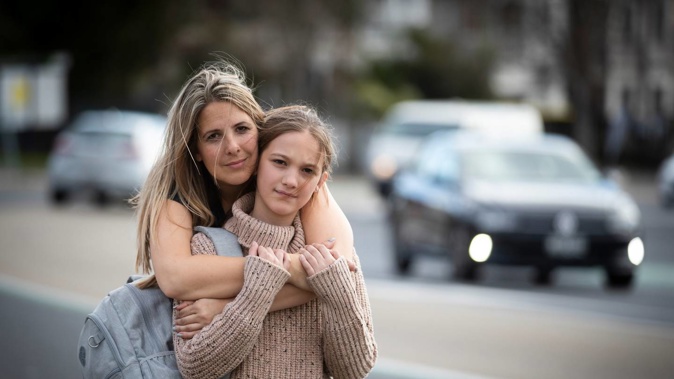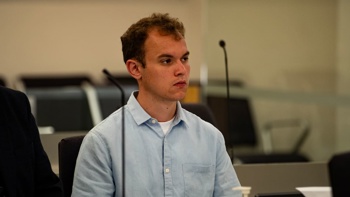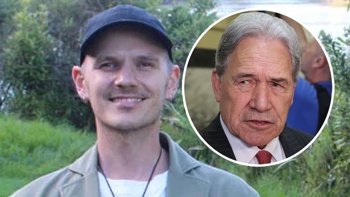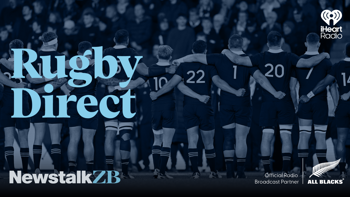
A girl with learning difficulties has had to leave a private school for children with dyslexia after officials cancelled her seat on a Government-funded minibus.
Grace, 13, has a speech and language disorder, dyslexia and an auditory processing disorder, which affects memory.
Until the end of Term 1 she was attending Summit Pt School in Takapuna, a private non-profit school for childrens with learning differences.
With nine students per class, and no moving between classes, Grace has thrived, and her reading level has jumped four years, according to the school.
She was able to get there each day from Coatesville in north Auckland thanks to specialised school transport assistance (SESTA), which is funded by the Ministry of Education for children with special needs.
But last year the ministry realised Grace was attending a private school and cancelled her seat, which it says was given by mistake.
Grace's mum Louise Sutherland says there is space on the minibus - which runs close to their house - and the family offered to pay for the seat.
But the Ministry of Education said no. It couldn't subcontract, or provide costings as the information was commercially sensitive.
'Like speaking a different language'
Grace's family moved here from the UK. Back there she had a fulltime teacher aide but still couldn't follow what was happening in class.
"They had big long sentences that I didn't really get," she said. Her class of 30 was too noisy, which meant "I can't really concentrate, I kind of get distracted...I was usually taken out of the class."
It felt like the teachers were speaking a different language, she said.
Her mum said Grace "came home crying every night and was emotionally exhausted and didn't understand many things about school life".
"They didn't bother to do maths with her because they felt that it was pointless ... they felt that her academic level was so low that she'd never get it up."
But from the first day at Summit Pt, Grace told the Herald "I felt a bit more safe and I felt a bit more social". She was doing the same work as her friends, instead of sitting in the corner with a teacher aide.
It wasn't just the different way of teaching - the class sizes meant Grace wasn't overwhelmed by noise and having to find her way around the school.
About half the students are there on scholarships; the others, including Grace, were paying $15,000 per year. Sutherland took a job at Bunnings to pay the fees.
After Grace's SESTA was cancelled, the family tried to keep sending her to Takapuna while juggling transport for their two other girls to get to school near their home in Coatesville. But it proved impossible, and Uber wasn't an option at $14,000 a year.
The family were grateful for lockdown, which meant Grace could keep attending. Although lockdown and online learning gave them a reprieve, Grace left Summit Point at the end of Term 1.
Her parents have been scrambling to find another school closer to home where Grace won't lose her hard-won learning or struggle to navigate school life or make friends.
One private school wouldn't enrol Grace because of her learning difficulties, despite accepting her sisters. Other suitable schools that specialised in learning differences were too far away.
/cloudfront-ap-southeast-2.images.arcpublishing.com/nzme/W35NH6TMO4B37G5TLT2LAHABNY.jpg)
Louise Sutherland with her daughter Grace, 13, who has significant learning difficulties. Photo / Jason Oxenham
This week she was overjoyed when a state-integrated school closer to home offered Grace a spot. The school has assured Sutherland they have special needs support and are holding Grace back a year which Sutherland said was great.
But she's still nervous about her daughter's ability to navigate classroom changes and cope with the school's relatively large roll.
Getting Grace to an appropriate school shouldn't have been this hard, Sutherland said. In the UK, the Government funded transport for all children with special needs to get to school even if they went private.
"[New Zealand] can support children with Asperger's and autism in mainstream schools but children who are academically low, with dyslexia and APD, there's not a place for you," Sutherland said.
"I'm saying okay, you can't provide the education, that's fine I'll go fund it myself. But please support me to get my child to school."
Summit Pt founder Rebecca Elias said many of their students would use SESTA transport if they could, but the criteria were "very black and white".
There was a myth that private school kids were all posh and had rich parents, she said.
"We run on the sniff of an oily rag ... It's not a choice. [Families] are getting second mortgages, using trusts, they're using loans."
The ministry had told Summit Pt School and Grace's family they could set up their own private arrangement with the transport provider. Elias said they tried, but it was "excruciatingly expensive" and a logistical nightmare.
/cloudfront-ap-southeast-2.images.arcpublishing.com/nzme/XY5YTRF3ZK7VNF7L3LNG7FSOL4.jpg)
Summit Point School founder Rebecca Elias. Photo / Simon Collins
In a statement, the ministry told the Herald parents had primary responsibility for getting kids to school; SESTA helped them overcome barriers to education such as mobility needs.
"We must meet statutory requirements which means we can only transport eligible students to and from state and state-integrated schools."
There were no plans to change eligibility criteria, the statement said.
Parents who weren't eligible for SESTA help could make a private arrangement with a transport provider. Officials had given Grace's family the contact details for the SESTA provider to that end.
Take your Radio, Podcasts and Music with you









